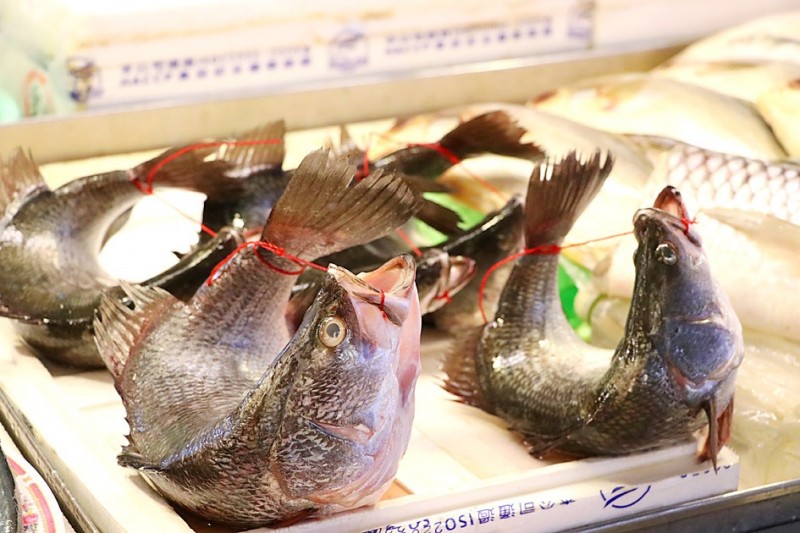《TAIPEI TIMES》 Group seeks the end of tethering at fish markets

An Asian sea bass is tethered at a market in an undated photograph. Photo courtesy of the Environment and Animal Society of Taiwan
NO BREACH: Environmentalists said the practice of puncturing the mouth and a gill to tie fish is a painful process that prolongs suffering for up to 12 hours
By Wu Hsin-tien and Dennis Xie / Staff reporter, with staff writer
Fish tethering — live fish being bound in a “U” shape to keep them fresh — causes unnecessary pain and poses a food safety threat, animal right groups said yesterday.
Asian sea bass, also known as barramundi, make up 70 percent of farmed sea bass in Taiwan, with information from the Fisheries Agency showing that about 10.35 million of them were sold last year.
The Environment and Animal Society of Taiwan estimated that 3.45 million tethered Asian sea bass were sold last year.
Vendors tether the fish by puncturing the mouth and a gill and tying red string in the holes that loops around the tail, a painful process that prolongs the time they can survive out of water by eight to 12 hours before they die in terror, the group said.
Research has shown that pain causes the fish to generate additional lactic acid, which taints the meat, it said.
Fish should be “rendered unconscious or killed immediately after capture” to reduce their suffering, otherwise endocrine changes triggered by pain results in reduced meat quality, National Taiwan Ocean University associate professor of aquaculture Huang Chih-yang (黃之暘) said.
Bacteria in water sprinkled on tethered fish to help keep them alive can enter the wounds and contaminate the flesh, Huang said.
Taipei Animal Protection Office Animal Rescue Team leader Wu Ching-an (吳晉安) said that vendors who tether are not in breach of the Animal Protection Act (動物保護法), as they do not intend to torture the fish.
The authorities should extend humane slaughter rules to cover fish so that vendors would be accountable to those regulations, Wu said.
While tethered fish are a common sight at the Taipei Fish Market, the team has not received complaints, which shows that people’s awareness of animal protection needs to be enhanced, he said.
The Environment and Animal Society called on the Council of Agriculture to promulgate animal welfare regulations regarding farming, transportation, sale and slaughter of fish and to educate people on fish welfare.
Fisheries Agency Deputy Director-General Lin Kuo-ping (林國平) said tethering is traditional in Taiwan, but raising public awareness about fish welfare is a discussion worth having.
“Discussion over this issue would have to involve research and input from the government, industry and academics,” Lin said. “The Fisheries Agency will convene a meeting of experts to discuss the matter as soon as possible.”
新聞來源:TAIPEI TIMES
















